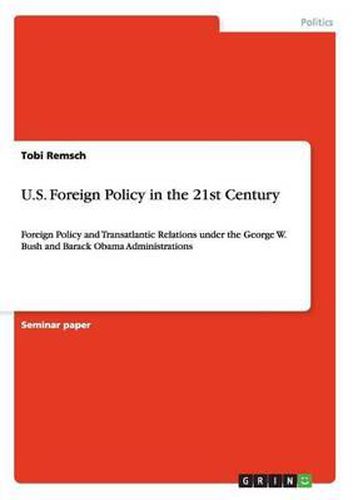Readings Newsletter
Become a Readings Member to make your shopping experience even easier.
Sign in or sign up for free!
You’re not far away from qualifying for FREE standard shipping within Australia
You’ve qualified for FREE standard shipping within Australia
The cart is loading…






Seminar paper from the year 2011 in the subject Politics - International Politics - Region: USA, grade: 1,3, University of Potsdam (Wirtschafts- und Sozialwissenschaftliche Fakultat), course: Introduction to American Poltics, language: English, abstract: 10 years ago, almost to the day, terrorists hijacked 4 four planes, flying two of them into the Twin Towers of the World Trade Center and one into the Pentagon. The fourth airliner came down in rural Pennsylvania, when travelers tried to regain control of the cockpit. Almost 3000 people lost their lives in the attacks on September 11, 2001, when the Islamist group al-Qaeda put an early end to what seemed like the beginning of an era of unprecedented peace and security for the United States of America. After the breakup of the Soviet Empire and the end of the Cold War, the USA has emerged as the world’s lone superpower, with no rival state possessing sufficient military, economic or technological strength to impose a serious threat on them. American foreign policy, whose focal point had been the containment of Soviet power for over 40 years, became less important and the public interest focused on domestic issues. How did the end of the Cold War era and the terrorist threat affect American Foreign Policy? Three years after the election of Barack Obama, this paper aims at contrasting the administrations of both the American presidents of the 21st century in regard to their foreign policy making on the one hand, and the consequent transatlantic relations on the other. What are the specific characteristics of Bush’s and Obama’s approach to foreign policy problems? What are the differences and similarities? In what way have both presidents shaped the relations to international organisations as well as their allies in Europe?
$9.00 standard shipping within Australia
FREE standard shipping within Australia for orders over $100.00
Express & International shipping calculated at checkout
Seminar paper from the year 2011 in the subject Politics - International Politics - Region: USA, grade: 1,3, University of Potsdam (Wirtschafts- und Sozialwissenschaftliche Fakultat), course: Introduction to American Poltics, language: English, abstract: 10 years ago, almost to the day, terrorists hijacked 4 four planes, flying two of them into the Twin Towers of the World Trade Center and one into the Pentagon. The fourth airliner came down in rural Pennsylvania, when travelers tried to regain control of the cockpit. Almost 3000 people lost their lives in the attacks on September 11, 2001, when the Islamist group al-Qaeda put an early end to what seemed like the beginning of an era of unprecedented peace and security for the United States of America. After the breakup of the Soviet Empire and the end of the Cold War, the USA has emerged as the world’s lone superpower, with no rival state possessing sufficient military, economic or technological strength to impose a serious threat on them. American foreign policy, whose focal point had been the containment of Soviet power for over 40 years, became less important and the public interest focused on domestic issues. How did the end of the Cold War era and the terrorist threat affect American Foreign Policy? Three years after the election of Barack Obama, this paper aims at contrasting the administrations of both the American presidents of the 21st century in regard to their foreign policy making on the one hand, and the consequent transatlantic relations on the other. What are the specific characteristics of Bush’s and Obama’s approach to foreign policy problems? What are the differences and similarities? In what way have both presidents shaped the relations to international organisations as well as their allies in Europe?